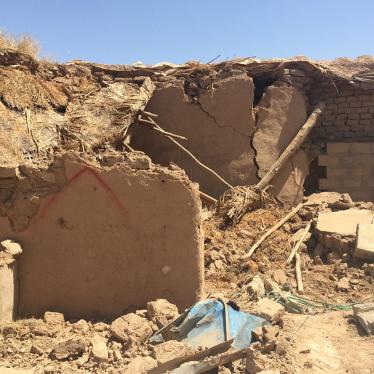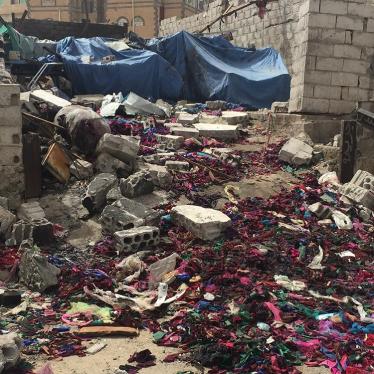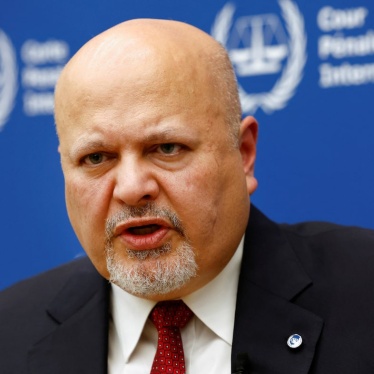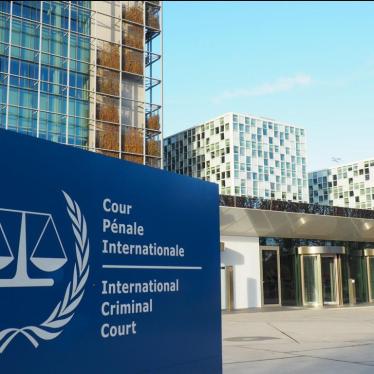(New York) – Yemen’s parliament should reject a draft law that would grant amnesty to President Ali Abdullah Saleh and anyone who served with him for crimes committed during his 33-year rule, Human Rights Watch said today. The sweeping measure could result in impunity for serious international crimes such as deadly attacks on anti-government demonstrators in 2011.
“Passing this law would be an affront to thousands of victims of Saleh’s repressive rule, including the relatives of peaceful protesters shot dead last year,” said Sarah Leah Whitson, executive Middle East director at Human Rights Watch. “Yemeni authorities should be locking up those responsible for serious crimes, not rewarding them with a license to kill.”
The draft law, which the parliament is expected to debate as early as January 11, 2012, violates Yemen’s obligations under international law to investigate and prosecute serious international crimes such as torture, war crimes, and crimes against humanity, Human Rights Watch said.
Bowing to international pressure and 10 months of protests against his rule, Saleh agreed in November to cede power under an accord brokered by the Gulf Cooperation Council (GCC). In exchange, the GCC deal instructed Yemen’s parliament, which the ruling party dominates, to act on an immunity law before Saleh is to step down formally on February 21, 2012.
The granting of immunity would not prevent courts in other countries from prosecuting serious human rights crimes in Yemen under universal jurisdiction laws, Human Rights Watch said. “Even if the Yemeni parliament grants immunity, the law will not hold water abroad,” Whitson said.
An article in the draft law bars its “repeal or appeal” by either lawmakers or the courts. However, article 51 of the constitution of Yemen says citizens have the right of recourse to the courts to protect their rights and lawful interests. Article 153 of the constitution designates the Supreme Court as the highest judicial authority in the land and empowers it to strike down laws that are unconstitutional.
The preamble to the immunity law wrongfully suggests it was drafted to implement United Nations Security Council resolution 2014 of October 21, 2011, Human Rights Watch said. In fact, the Security Council resolution calls on all parties in Yemen to implement a political settlement based on the GCC accord – rather than adopt the accord itself – and also emphasizes that “all those responsible for violence, human rights violations and abuses should be held accountable.”International law rejects impunity for serious crimes, such as genocide, war crimes, crimes against humanity, and torture. International treaties, including the UN Convention against Torture and the 1949 Geneva Conventions, require parties to ensure alleged perpetrators of serious crimes are prosecuted. As recently as January 6, UN High Commissioner for Human Rights Navi Pillay reasserted thatamnesty cannot be granted for serious crimes under international law.
Human Rights Watch has confirmed the deaths of 270 protesters and bystanders during attacks by government security forces and gangs on largely peaceful demonstrations against Saleh’s rule in 2011, most in the capital, Sanaa. Dozens more civilians were killed last year in apparently indiscriminate attacks by security forces on densely populated areas during clashes with armed opposition fighters. Human Rights Watch also has documented a broad pattern of international human rights violations and laws-of-war violations by government security forces in previous years, including apparent indiscriminate shelling in the 2004-2010 civil war against northern Huthi rebels and the use of unnecessary and lethal force since 2007 to quash a separatist movement in the south.
“From north to south to central Sanaa, the Saleh government has violated the basic rights of the Yemeni people,” Whitson said. “Without accountability for these crimes, there can be no genuine break from the past in a post-Saleh Yemen.”





